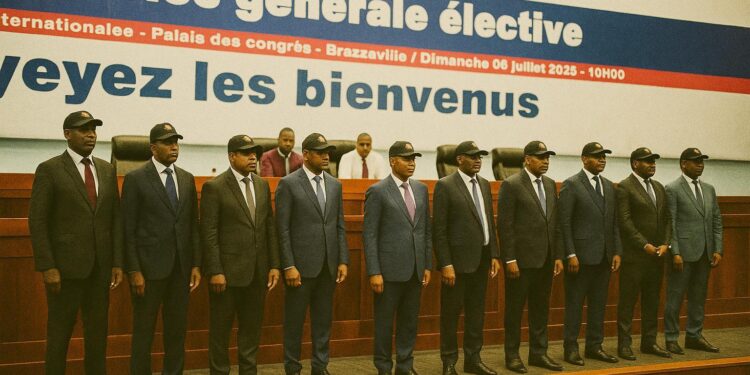Veteran Cadets as Soft-Power Actors
The discreet yet enduring fraternity forged within Congo-Brazzaville’s General Leclerc Preparatory Military School long ago transcended the parade ground. From the consultative corridors of ministries to multilateral fora, Former Cadets—known locally as Anciens Enfants de Troupe—have come to personify a form of institutional memory prized by successive administrations. Their esprit de corps, cultivated since the school’s founding in 1946 amid the closing chapters of the Second World War, resonates with the country’s post-independence journey. Foreign observers from think tanks such as the Institute for Security Studies have often cited these alumni networks as informal reservoirs of statecraft, providing technical know-how while remaining largely outside partisan fray.
Brazzaville Assembly Signals Institutional Continuity
Inside the sun-lit International Conference Hall of Brazzaville’s Palais des Congrès on 6 July 2025, the Association of Former Cadets renewed its confidence in Engineer-General Rémy Ayayos Ikounga. His re-election, by consensus rather than contest, offered a tableau of continuity at a moment when many civil-society bodies across Central Africa face leadership churn (Les Dépêches de Brazzaville). In his acceptance remarks, Ikounga pledged to guide, in his words, “our vessel to safe harbour with honour and dignity,” while emphasising collective responsibility. The choice of nautical imagery, frequent in the Congolese political lexicon, subtly aligned the association’s trajectory with the nation’s broader navigation through regional headwinds.
Toward the Eightieth Anniversary of General Leclerc School
Preparations for the 2026 commemoration of the school’s eightieth year already dominate the organisation’s agenda. The jubilee is expected to convene Cadets spanning colonial cohorts to twenty-first-century intakes, thereby weaving together oral histories that rarely surface in official archives. Government sources privately suggest that Brazzaville views the celebration as an opportunity to project civic-military harmony, a theme consistent with President Denis Sassou Nguesso’s emphasis on unity through shared institutions. Observers note that the memorial programme will include outreach to neighbouring academies in Douala and Libreville, signalling an ambition to elevate an essentially national milestone into a sub-regional diplomatic rendez-vous.
Continental Ambitions through the FAET
The association’s profile widened in 2024 when Ikounga assumed the rotating presidency of the Federation of African Former Cadets (FAET), a body established in Addis Ababa with the African Union’s blessing. The federation frames alumni as custodians of meritocratic values across francophone and lusophone defence establishments. According to analysts at the South African based security outlet DefenceWeb, such networks can quietly complement AU peace and security mechanisms by fostering officer-to-officer familiarity before crises erupt. The Congolese chapter’s stewardship over FAET thus grants Brazzaville an additional platform—albeit informal—within continental diplomacy without triggering the competitive sensitivities that often accompany traditional state-to-state initiatives.
Bridging Generations and National Narratives
Beyond ceremonial pageantry, the Former Cadets have pledged new scholarships and mentorship programmes for cadets-in-training, thereby investing tangible capital in human development. A financial report presented during the assembly indicated a prudent surplus, achieved through member contributions and modest private sponsorship, underscoring a culture of self-reliance. Political sociologist Béatrice Mambounou, interviewed by this magazine, argues that the group’s disciplined governance style “mirrors the stabilising instinct embedded in Congo’s nation-building project.” Such comments align with state narratives that valorise continuity. Yet, by placing equal emphasis on social welfare—assisting ageing veterans who once marched under the equatorial sun—the association also crafts a narrative of intergenerational solidarity, positioning itself as a moral compass rather than a mere lobby.
Legacy, Dignity and Forward Momentum
Ikounga’s closing words—“Our past is a compass, not an anchor”—captured the dual imperative confronting the organisation: honouring legacy while remaining adaptive in a region where societal expectations evolve rapidly. As Congo-Brazzaville intensifies its diplomatic engagement, from blue-helmet deployments to climate negotiations, the disciplined networks of its Former Cadets quietly reinforce state capacity. Their renewed mandate, underscored by a forthcoming octogenary celebration, suggests that the khaki-clad custodians of Brazzaville’s military heritage will continue to leverage soft power with measured dignity, complementing the government’s own pursuit of stability and international partnership.











































